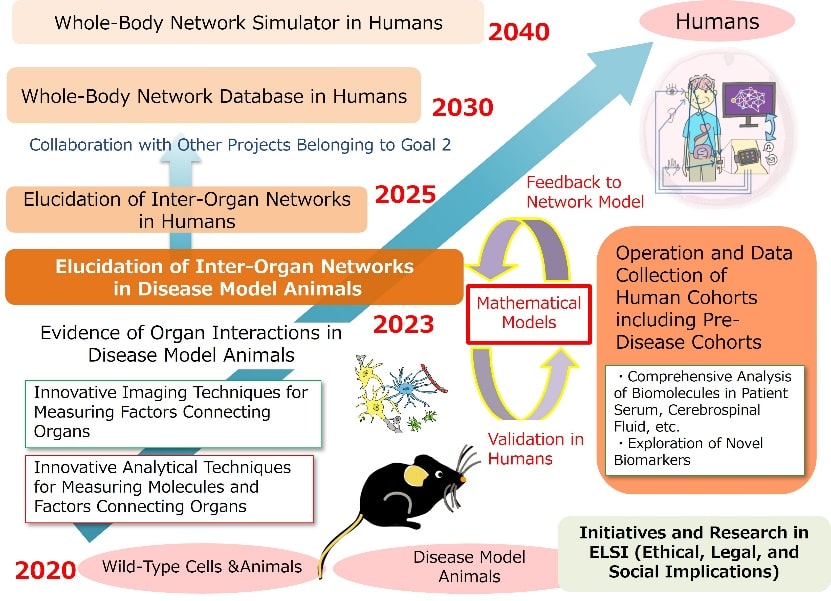R&D Project

Goal 2 R&D Projects (Selected in 2020)Towards Overcoming Disorders Linked to Dementia based on a Comprehensive Understanding of Multiorgan Network
Project manager (PM)TAKAHASHI RyosukeSpecially Appointed Professor, Graduate School of Medicine, Kyoto University
Summary of the project
One of the major sociomedical problem is the increasing rate of dementia and related disorders due to the super aging society. Recent studies have shown that systemic abnormalities such as autonomic dysfunction and chronic inflammation are already present in the early stages of dementia. Our goal is to understand how these changes alter multi-organ networks and contribute to the development of dementia. By 2050 we aim to achieve ultra-early prediction and prevention of dementia, collaborating with other projects under Goal 2, and by 2030 we aim to clarify the alteration of multi-organ networks related to dementia, enabling ultra-early prediction and early return of the achievement to the society. The R&D themes in this project include research for the three most common dementia as well as the development of basic technologies supporting these research and mathematical approach to understand multi-organ networks. We will also conduct ELSI research to make our achievement acceptable to society.
Milestone by year 2030
Establishment of Whole-Body Network Atlas which can predict the development of dementia in “healthy” individuals within 10 years by analyzing non-invasive biomarkers such as blood, urine, and stool samples.
Milestone by year 2025
The development of dementia can be predicted at least one year before the onset by clarifying the alteration of multi-organ networks in individuals with dementia using invasive and non-invasive biomarkers such as peripheral blood, spinal fluid, and imaging etc.

R&D theme progress reports
- [1-4] Brain and multi-organ network in Alzheimer’s disease, vascular dementia and Parkinson’s disease dementia (1)
- [1-4] Brain and multi-organ network in Alzheimer’s disease, vascular dementia and Parkinson’s disease dementia (2)
- [5] Elucidation of Inter-Organ Networks in Dementias by AI and Mathematical Research
- Progress Report (474KB)
Performers
| Theme [1] | YAMANAKA Koji | Nagoya University |
|---|---|---|
| Theme [1] | HIGUCHI Makoto | National Institutes for Quantum Science and Technology |
| Theme [1] | TOMITA Taisuke | The University of Tokyo |
| Theme [1] | SAITO Takashi | Nagoya City University |
| Theme [1] | SATOH Takashi | Institute of Science Tokyo |
| Theme [1] | FURUKAWA Takahisa | The University of Osaka |
| Theme [1] | HIBINO Hiroshi | The University of Osaka |
| Theme [1] | TSUDA Makoto | Kyushu University |
| Theme [1] | MAKI Takakuni | Kyoto University |
| Theme [1] | MOCHIZUKI Naoki | National Cerebral and Cardiovascular Center |
| Theme [1] | KUBOTA Yoshiaki | Keio University |
| Theme [1] | MIZUTANI Kiyohito | Tokushima University |
| Theme [1] | MATSUMOTO Riki | Kobe University |
| Theme [1] | YAMAKADO Hodaka | Kyoto University |
| Theme [1] | HATTORI Nobutaka | Juntendo University |
| Theme [1] | TAKAHASHI Yuji | National Center of Neurology and Psychiatry |
| Theme [1] | MIYAKE Sachiko | Juntendo University |
| Theme [1] | MATSUI Hideaki | Niigata University |
| Theme [1] | KINOSHITA Makoto | NHO Osaka Toneyama Medical Center |
| Theme [1] | HIOKI Hiroyuki | Juntendo University |
| Theme [1] | NITTA Ryo | Kobe University |
| Theme [1] | OHTSUKA Toshihisa | University of Yamanashi |
| Theme [1] | WATABE M Ayako | The Jikei University School of Medicine |
| Theme [1] | MARUOKA Hisato | Kanazawa University |
| Theme [1] | HANAFUSA Hiroshi | Nagoya University |
| Theme [2] | HONDA Naoki | Nagoya University |
| Theme [2] | KOJIMA Ryosuke | Kyoto University |
| Theme [2] | MATSUDA Takeru | The University of Tokyo |
| Theme [2] | OKADA Yukinori | The University of Osaka |
| Theme [2] | KONDO Yohei | Nagoya University |
| Theme [2] | NAKAOKA Shinji | Hokkaido University |
| Theme [2] | MUTO Kaori | The University of Tokyo |
PDF Download
- Summary of the project (215KB)